AUCTORES
Globalize your Research
Review Article | DOI: https://doi.org/10.31579/2642-9756/111
1 Junior Project Manager, Active Citizenship Network, c/o Cittadinanzattiva APS, Via Cereate, 6 - 00183 Rome, Italy.
2 Community & Fellowship Assistant, Active Citizenship Network, c/o Cittadinanzattiva APS, Via Cereate, 6 - 00183 Rome, Italy.
3 Expert in narrative medicine, Responsible for Cittadinanzattiva-Emilia Romagna of the CRAMCReD - Regional Coordination of Chronic, Rare and Disability Disease Associations.
*Corresponding Author: Mariano Votta, Unior Project Manager, Active Citizenship Network, c/o Cittadinanzattiva APS, Via Cereate, 6 - 00183 Rome, Italy.
Citation: Mariano Votta, Ana Aviles, Rossana Di Renzo, Marilena Vimercati. (2022). Supporting Non-Communicable Disease Patients in Time of The Covid-19 Pandemic: From Motivating Them to Qualifying the Role of Their Caregivers. J. Women Health Care and Issues. 5(3); DOI:10.31579/2642-9756/111
Copyright: © 2022 Mariano Votta, This is an open access article distributed under the Creative Commons Attribution License, which permits unrestricted use, distribution, and reproduction in any medium, provided the original work is properly cited.
Received: 23 February 2022 | Accepted: 18 March 2022 | Published: 30 March 2022
Keywords: caregivers; non-communicable diseases (ncds); chronic patients; european union; patients’ rights; civic participation; patients’ advocacy groups (pags)
Evidence collected globally during the pandemic show that Covid-19 has had a significant impact on patients suffering from non-communicable diseases (NCDs). Indeed, oncological and chronic patients have been left almost alone for several months, especially during the first wave of the pandemic.
At the European level, the hope is that the measures adopted thanks to the Next Generation EU Fund [1] can have, in the shortest period possible, a significant impact towards more resilient healthcare systems in each Member State, in which the issue of health acts as a key element within their National Resilience and Recovery Plans (NRRPs). In addition to this, it is extremely essential to act on two sides: to motivate patients to not neglect their treatment path, and to support as much as possible the ones who informally help them in the shadow. In fact, behind every sick person there is often a caregiver, for many of whom every day the work of care takes up almost all of their daily time, with considerable expenditure of physical and mental energy.
What is the situation of caregivers across Europe? While challenges faced by patients are a frequently discussed topic, not much is known about the issues caregivers face daily. To shed light on the latter in Italy has been a civic survey carried out along 2020 by the Italian NGO Cittadinanzattiva [2], engaged also at the European level in order to motivate patients and, as an Ambassador of the EU Pillar of Social Rights [3], committed with EU institutions to implement the 20 principles of the Pillar for the benefit of both patients and their caregivers.
The population of elderly people aged 65 years or more will increase from 87.5 million in 2010 to 152.6 million in 2060 in the European Union. Indeed, in the EU countries, on average 3–4% of the people aged over 65 are provided with long-term institutional care [4]. This demographic trend shows a dynamic increase in demand for services of long-term care, mainly concerning a growth in the number of the elderly requiring care in their homes. In this sense, community care has become a prominent EU priority in the last few years, as also confirmed by the Horizon 2020 “Call on better health and care, economic growth and sustainable health systems” [5], and the shift towards home-based care is seen as a practical measure to contain the costs of services while supporting widespread preferences among older people. All of this puts more and more pressure on informal carers who in most European countries already provide a large part of long-term care for dependent people with disabilities, chronic or degenerative and rare diseases. In fact, at different stages of the disease, caregivers perform different tasks: they collaborate in the assistance during hospitalization, discuss with the doctors, deal with the various bureaucratic procedures, and take care of the family. They interact with the general practitioner and the social-health network and collaborate in daily nutrition, they help with personal hygiene, mobility and facilitate family and social relationships. The consequences of this kind of work often include lack of rest, damage to health, reduction/loss of employment, poverty, inability to accrue a pension, lack of time for oneself, isolation, and stress. What is worse is that caregivers are usually alone in facing a huge number of obstacles in their daily life for a period of time of which they do not know neither the duration nor the end since the timing of caregiving may vary from a few years to more than 30 years. Most times they also face the difficult situation of managing not only their own loved one, but the entire complex health, family, social and bureaucratic situation. They care seven days a week and they don't have vacations. Their daily routine foresees commitment of 4/6 hours of direct work and 10 hours of indirect work.
Nonetheless, their role is strategic because it can impact on the person's adaptation to the new condition of illness, promoting a better quality of life for them, while at the same time performing an important welfare action instead of the institutions. However, in all their tasks, caregivers are forced to cope with many fights, such as the slowness and the fragmented responses of the social-health system, the bureaucracy, the physical and cultural barriers, and this happens in total isolation without an accompanying person.
Especially nowadays, with the Covid-19 pandemic still present, the provision of complex formal and informal care and the need to provide adequate care to these vulnerable older adults, who have experienced even more complex situations, constitute a great challenge facing our society on many levels. For instance, in Italy, the XIX National Report on Chronic Policies entitled "The care that (still) isn't there" [6], presented in December 2021 and realized by Cittadinanzattiva with the involvement of 64 associations of patients with chronic and rare diseases belonging to the National Coordination of Chronic Patients Associations (CnAMC) [7] and of 3000 patients circa, has thoroughly highlighted the difficult situation faced by both patients and their caregivers. Regarding chronic and non-communicable disease patients, especially in the first wave of the Covid-19 pandemic (first half of 2020), they have been left somewhat alone for months, suffering for social distance and lockdown to avoid getting the virus, while still requiring constant doctor visits, checkups, follow-ups, prescription refills, medicines, and routine care. According to the Report mentioned above, one patient out of two, at the beginning of 2022, still states that the pandemic has increased the criticality of access to diagnosis and treatment for their diseases. Postponements and delays continue to affect specialist and diagnostic visits, and there are increasing difficulties in activating integrated home care and in obtaining recognition of disability or handicap. On the positive side, things are going better on the prevention front, thanks to the recovery of some delays in scheduled screenings and ordinary vaccinations. However, on the negative side, private costs are increasing for one out of two patients and one out of five has been forced to give up treatment for economic reasons. Together with the difficulties and requests of citizens affected by chronic and rare diseases, there are those of family caregivers - more than seven million in Italy - who are asking for less bureaucracy and more protection at work and, for the youngest, in their studies. On this last note, concerning age, according to the Report, 47.6% of caregivers fall into the 51-65 age bracket, 27% in the 36-50 years category, 18.7% in the 66-80 years one, and 4.6% are between 25-35 years of age, showing how the work of caregiving has no age and may impact on each category of individuals.
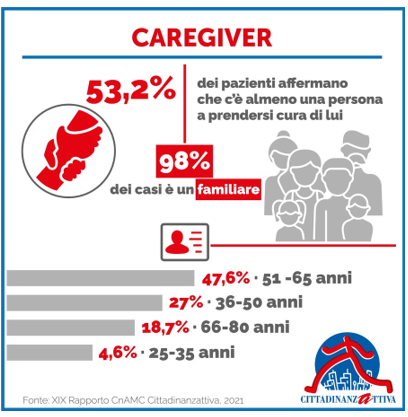
In Italy, caregivers constitute a real army of invisible people which support the welfare system by caring for ill patients without any remuneration. On average, 17.4% of the population, over 8.5 million people, are caregivers. As mentioned previously, often these people are themselves elderly, like the family members they assist, but this is not always the case: more than 390 thousand are young caregivers who are between 15 and 24 years old: young people who regularly take care of a family member, devoting time, energy, balance and well-being to the family [8]. To address the huge burden faced by informal caregivers, Cittadinanzattiva Emilia-Romagna [9] realized the civic campaign “I have the right to…” [10] with the objective to ask for more rights, more health protection, and a better quality of life for caregivers. 200 caregivers have participated to the campaign by sending their personal stories, which have been analyzed in the report titled “What if caregivers did not really exist?” [11]. At the same time, across Europe, the “This is Living” campaign [12], developed by Boehringer Ingelheim Pharmaceuticals Inc. [13] and to which Cittadinanzattiva, through its European branch Active Citizenship Network [14], has been actively contributing, has been showing its support on the pursuit of health and wellness in any shape by producing useful resources and materials to meet the needs of patients suffering from non-communicable diseases and chronic conditions.
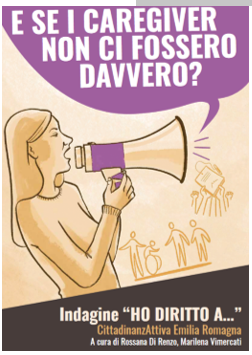
Qualifying the role of caregivers in the Italian context: “I have the right to…” campaign
The civic campaign “I have the right to…”, launched online in early January 2020, was promoted at the national level by Cittadinanzattiva Emilia-Romagna, together with the following patient advocacy groups (PAGs): AMICI ONLUS – National Association of Chronic Intestinal Diseases [15]; ANTR - National Association of Kidney Transplants [16]; ARAD - Association for Research and Care of Dementia [17]; PARKLINK - Patients and Caregivers Committee of Bologna; CFU - Italy OdV [18]; FAIS - Federation of Associations of Incontinents and Ostomates [19]; Parkinson's Group Carpi OdV [20]; RESPIRO LIBERO – Association for the quality of life of children and allergic children [21]; UILDM - Section of “Carlo and Innocente Leoni" Bologna [22], which are all part of the Regional Coordination of Associations of Chronic and Rare patients (CrAMCR) [23]. The campaign aimed at giving voice to people who life has hit hard and who have not been given discounts, creating a virtual space so that their stories would enter our daily lives and be shared with the community. It has seen the adhesion of 200 citizens who have shared their experience by accessing the webpage dedicated. The tool, used to collect and analyze narratives, was that of Narrative Medicine. The stories arrived in less than a month, confirming how much the theme of caregiving is relevant: all of them in a few lines or in intense pages have allowed to enter and understand their daily lives in terms of hardships but also of small joyful moments, and especially their requests for a recognition of their role.
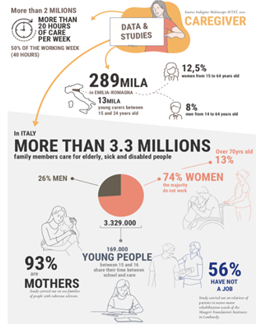
The stories collected underlined the essentiality of caregivers, generating the question: “What if caregivers weren't really there? Who would do the work of "caring"?”. From this question has emerged the drafting, in November 2020, of the report titled “What if caregivers did not really exist?”, which shows the results of a qualitative analysis of the narratives sent by family caregivers to the campaign. The report is addressed, in particular, to politicians, institutions, professional associations, trade unions, citizens and at a cooperative and collaborative community, because it is time for everyone to do their part. The report is structured in two parts: the first part is dedicated to the exploration of the caregiving phenomenon with particular attention to the Italian context; the second part reports the results of the "I have the right to..." campaign of Cittadinanzattiva Emilia-Romagna. Since the best way for people to discover the stories was through the voice of caregivers themselves, the report is completed by an appendix in which 10 podcasts are presented that recount 10 rights denied to caregivers [24], chosen among the testimonies received during the campaign.
The first picture which emerges from the report shows how, of the 200 testimonies collected, most of them were women's voices (86%): mothers, daughters, sisters, wives/partners who for more or less years have been taking care of a loved one with sometimes penalizing consequences on their work, but also on the side of overall family management. The few men (14%) who participated also shared their stories as carers of their wife, child or elderly parent, highlighting how carers can be men too and how pain, understanding, sensitivity and love are also emotions that men experience, an issue frequently underrated.

Most of all, the report underlines how for 90.8% of caregivers, bureaucracy is "a mountain on their shoulders" representing an obstacle in the different areas in which they interact. Often the abundance of measures produced by the legislature, the bureaucratic slowness, and the lack of coordination between administrative bodies causes for the caregiver to find himself in a labyrinth from which he often comes out defeated. As a matter of fact, rather than economic support, they ask for functioning services such as assistance in everyday life (64%), proper information (25%) guidance on the practices to be followed and training in order to be qualified to fulfill their role (11%).
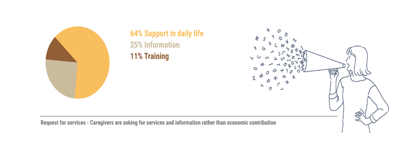
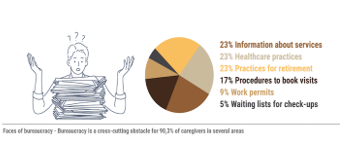
Regarding legal and economic recognition of caring, 7% of caregivers request recognition of their role as real work, demanding primarily legitimacy of their pension rights and, for those who have a job, asking for benefits and opportunities to reconcile work time and care time. In this framework, 42% ask for pension, 34% for economic contribution, 24
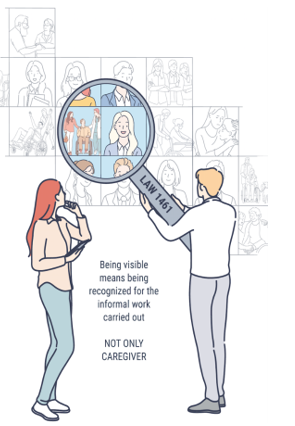
Motivating non-communicable disease patients at the European level: “This is Living” campaign
Equally significant as the need to recognize the support caregivers give to chronic patients is the need to motivate patients themselves. For this reason, at the European level, the "This is Living" communication campaign, developed by Boehringer Ingelheim Pharmaceuticals Inc., has been launched in the late 2021 to show its support on the pursuit of health and wellness in any shape or form, big or small, and to celebrate all the little things that we can do daily to improve our health. The campaign has involved in the production of materials and key messages Cittadinanzattiva, through its international branch Active Citizenship Network, together with the following patient organization representatives: European Coalition for People living with Obesity (EASO-ECPO) [32]; European Liver Patients’ Association (ELPA) [33]; European Pulmonary Fibrosis Federation (EU-IPFF) [34]; Federation of European Scleroderma Associations (FESCA) [35]; Global Alliance of Mental Illness Advocacy Networks-Europe (GAMIAN-Europe) [36]; Lupus Europe [37]; Obesity UK [38]; World Heart Federation (WHF) [39].
The “This is Living” campaign offers a wide range of useful resources that can prove helpful for those living with a wide variety of chronic conditions, with specific sessions on kidney, liver, lung, or heart diseases, diabetes, obesity, autoimmune conditions, mental health conditions, and chronic conditions in general. In particular, Active Citizenship Network has contributed to the chronic conditions section with the drafting of two guides with the aim to help patients in preparing for the consultation with a health practitioner. The first guide called “Prepare to get the most out of your consultation” [40] helps patients to think about and gather all the information useful to get the most out of their health appointment, also taking into account that, of course, everyone has their own rhythms and routines to factor in. The second guide called “14 questions to ask your healthcare professional in your consultation” [41] aims at assisting patients to come with questions in hand which can maximize the value of the appointment for both the patient and the healthcare team. A clear list will, of course, reduce the rush of the visit and ensure that important information isn’t missed, but it can also strengthen the relationship with the healthcare provider. Getting a full picture of the areas one is unsure of will no doubt help going forward. But sharing them also gives care providers a clearer understanding of the patient and of how his or her condition specifically impacts daily life.
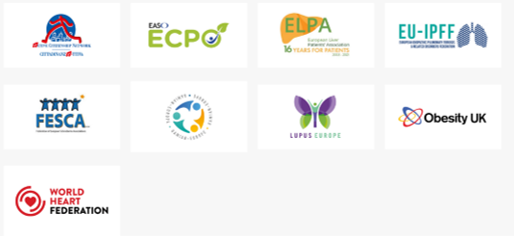
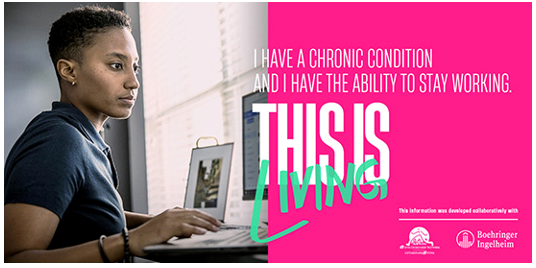
The Covid-19 pandemic has put us to the test and has enabled all of us to understand how health is a common good to be safeguarded. We have discovered ourselves fragile, isolated, but also with a renewed sense of responsibility, linked to the impact that our behavior may have on public health: a sense of responsibility that never abandons the caregiver in front of the needs of a patient suffering from non-communicable diseases. Today, let's not forget what we have experienced and look at the reality we live in with new eyes and a different mind. As life slowly gets back to something like normal, it can be difficult to pick up where we left off. Staying in control of our lives can be a daily struggle, especially due to the pandemic, and especially for those who live with a chronic condition. It’s time for a change, to work together to take back control and to focus on our health again. On this regard, at the European level, high expectations are also linked to the full implementation of the European Pillar of Social Rights [42], a vital instrument to achieve social justice and equality in the EU, proclaimed by the European Parliament, the Council and the Commission in 2017. The Pillar sets out 20 key principles [43] which represent the beacon guiding us towards a strong social Europe that is fair, inclusive and full of opportunity in the 21st century. Most of these, in fact, also apply to the situation faced by non-communicable disease patients and by their caregivers: life-long learning; gender equality; equal opportunities; active support to employment; healthy, safe and well-adapted work environment; inclusion of people with disabilities; long-term care. To contribute to the dissemination of these principles among citizens, in January 2020, Active Citizenship Network has been officially recognized by the European Commission’s DG Employment, Social Affairs and Inclusion as an Ambassador of the European Pillar of Social Rights with the aim to support communication initiatives to spread the 20 principles of the Pillar and highlight the importance of a social European dimension.
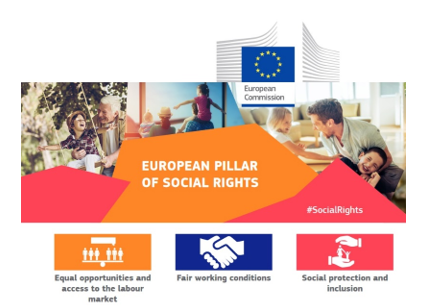
Declarations
Each of the authors confirms that this manuscript has not been previously published by another international peer-review journal and is not under consideration by any other journal. Additionally, all of the authors have approved the contents of this paper and have agreed to the submission policies of the journal.
Authors’ contribution
Each named author has substantially contributed to conducting the underlying research and drafting this manuscript. Additionally, to the best of our knowledge, the named authors have no conflict of interest, financial or otherwise.
Conflict of interest
The authors listed on the first page declare that they do not have any conflict of interest.
Acknowledgements
The authors wish to thank Anna Baldini, Regional Secretary of Cittadinanzattiva-Emilia Romagna for the support to the civic survey “I have the right to…”, together with the following experts: Graziano Benfenati, Coordinator of the PARKLINK Caregiver and Patients Committee; Lauro Casarini of the Parkinson Carpi OdV Group; Luisa Farinati, caregiver and active citizen; Francesco Fonzi, caregiver and Cittadinanzattiva Emilia-Romagna volunteer; Alice Greco, President of UILDM - Sezione di Bologna OdV -"Carlo e Innocente Leoni"; and Maria Vittoria Santoro, Responsible of the Tribunal for Patients’ Rights of Cittadinanzattiva Emilia-Romagna. The authors would also like to thank Martina Ghezzi, Salvatore Coscione and Alessio Iammarrone for the realization of the podcasts, the Scribing Agency for the production of all the infographic materials realized for the Report “What if caregivers did not really exist?” and used in the drafting of this article, and Santex S.p.A. for its unconditional support to the Report.
Lastly, the authors would like to thank Boehringer Ingelheim Pharmaceuticals Inc. for the development of the
“This is Living”
communication campaign
Clearly Auctoresonline and particularly Psychology and Mental Health Care Journal is dedicated to improving health care services for individuals and populations. The editorial boards' ability to efficiently recognize and share the global importance of health literacy with a variety of stakeholders. Auctoresonline publishing platform can be used to facilitate of optimal client-based services and should be added to health care professionals' repertoire of evidence-based health care resources.

Journal of Clinical Cardiology and Cardiovascular Intervention The submission and review process was adequate. However I think that the publication total value should have been enlightened in early fases. Thank you for all.

Journal of Women Health Care and Issues By the present mail, I want to say thank to you and tour colleagues for facilitating my published article. Specially thank you for the peer review process, support from the editorial office. I appreciate positively the quality of your journal.
Journal of Clinical Research and Reports I would be very delighted to submit my testimonial regarding the reviewer board and the editorial office. The reviewer board were accurate and helpful regarding any modifications for my manuscript. And the editorial office were very helpful and supportive in contacting and monitoring with any update and offering help. It was my pleasure to contribute with your promising Journal and I am looking forward for more collaboration.

We would like to thank the Journal of Thoracic Disease and Cardiothoracic Surgery because of the services they provided us for our articles. The peer-review process was done in a very excellent time manner, and the opinions of the reviewers helped us to improve our manuscript further. The editorial office had an outstanding correspondence with us and guided us in many ways. During a hard time of the pandemic that is affecting every one of us tremendously, the editorial office helped us make everything easier for publishing scientific work. Hope for a more scientific relationship with your Journal.

The peer-review process which consisted high quality queries on the paper. I did answer six reviewers’ questions and comments before the paper was accepted. The support from the editorial office is excellent.

Journal of Neuroscience and Neurological Surgery. I had the experience of publishing a research article recently. The whole process was simple from submission to publication. The reviewers made specific and valuable recommendations and corrections that improved the quality of my publication. I strongly recommend this Journal.

Dr. Katarzyna Byczkowska My testimonial covering: "The peer review process is quick and effective. The support from the editorial office is very professional and friendly. Quality of the Clinical Cardiology and Cardiovascular Interventions is scientific and publishes ground-breaking research on cardiology that is useful for other professionals in the field.

Thank you most sincerely, with regard to the support you have given in relation to the reviewing process and the processing of my article entitled "Large Cell Neuroendocrine Carcinoma of The Prostate Gland: A Review and Update" for publication in your esteemed Journal, Journal of Cancer Research and Cellular Therapeutics". The editorial team has been very supportive.

Testimony of Journal of Clinical Otorhinolaryngology: work with your Reviews has been a educational and constructive experience. The editorial office were very helpful and supportive. It was a pleasure to contribute to your Journal.

Dr. Bernard Terkimbi Utoo, I am happy to publish my scientific work in Journal of Women Health Care and Issues (JWHCI). The manuscript submission was seamless and peer review process was top notch. I was amazed that 4 reviewers worked on the manuscript which made it a highly technical, standard and excellent quality paper. I appreciate the format and consideration for the APC as well as the speed of publication. It is my pleasure to continue with this scientific relationship with the esteem JWHCI.

This is an acknowledgment for peer reviewers, editorial board of Journal of Clinical Research and Reports. They show a lot of consideration for us as publishers for our research article “Evaluation of the different factors associated with side effects of COVID-19 vaccination on medical students, Mutah university, Al-Karak, Jordan”, in a very professional and easy way. This journal is one of outstanding medical journal.
Dear Hao Jiang, to Journal of Nutrition and Food Processing We greatly appreciate the efficient, professional and rapid processing of our paper by your team. If there is anything else we should do, please do not hesitate to let us know. On behalf of my co-authors, we would like to express our great appreciation to editor and reviewers.

As an author who has recently published in the journal "Brain and Neurological Disorders". I am delighted to provide a testimonial on the peer review process, editorial office support, and the overall quality of the journal. The peer review process at Brain and Neurological Disorders is rigorous and meticulous, ensuring that only high-quality, evidence-based research is published. The reviewers are experts in their fields, and their comments and suggestions were constructive and helped improve the quality of my manuscript. The review process was timely and efficient, with clear communication from the editorial office at each stage. The support from the editorial office was exceptional throughout the entire process. The editorial staff was responsive, professional, and always willing to help. They provided valuable guidance on formatting, structure, and ethical considerations, making the submission process seamless. Moreover, they kept me informed about the status of my manuscript and provided timely updates, which made the process less stressful. The journal Brain and Neurological Disorders is of the highest quality, with a strong focus on publishing cutting-edge research in the field of neurology. The articles published in this journal are well-researched, rigorously peer-reviewed, and written by experts in the field. The journal maintains high standards, ensuring that readers are provided with the most up-to-date and reliable information on brain and neurological disorders. In conclusion, I had a wonderful experience publishing in Brain and Neurological Disorders. The peer review process was thorough, the editorial office provided exceptional support, and the journal's quality is second to none. I would highly recommend this journal to any researcher working in the field of neurology and brain disorders.

Dear Agrippa Hilda, Journal of Neuroscience and Neurological Surgery, Editorial Coordinator, I trust this message finds you well. I want to extend my appreciation for considering my article for publication in your esteemed journal. I am pleased to provide a testimonial regarding the peer review process and the support received from your editorial office. The peer review process for my paper was carried out in a highly professional and thorough manner. The feedback and comments provided by the authors were constructive and very useful in improving the quality of the manuscript. This rigorous assessment process undoubtedly contributes to the high standards maintained by your journal.

International Journal of Clinical Case Reports and Reviews. I strongly recommend to consider submitting your work to this high-quality journal. The support and availability of the Editorial staff is outstanding and the review process was both efficient and rigorous.

Thank you very much for publishing my Research Article titled “Comparing Treatment Outcome Of Allergic Rhinitis Patients After Using Fluticasone Nasal Spray And Nasal Douching" in the Journal of Clinical Otorhinolaryngology. As Medical Professionals we are immensely benefited from study of various informative Articles and Papers published in this high quality Journal. I look forward to enriching my knowledge by regular study of the Journal and contribute my future work in the field of ENT through the Journal for use by the medical fraternity. The support from the Editorial office was excellent and very prompt. I also welcome the comments received from the readers of my Research Article.

Dear Erica Kelsey, Editorial Coordinator of Cancer Research and Cellular Therapeutics Our team is very satisfied with the processing of our paper by your journal. That was fast, efficient, rigorous, but without unnecessary complications. We appreciated the very short time between the submission of the paper and its publication on line on your site.

I am very glad to say that the peer review process is very successful and fast and support from the Editorial Office. Therefore, I would like to continue our scientific relationship for a long time. And I especially thank you for your kindly attention towards my article. Have a good day!

"We recently published an article entitled “Influence of beta-Cyclodextrins upon the Degradation of Carbofuran Derivatives under Alkaline Conditions" in the Journal of “Pesticides and Biofertilizers” to show that the cyclodextrins protect the carbamates increasing their half-life time in the presence of basic conditions This will be very helpful to understand carbofuran behaviour in the analytical, agro-environmental and food areas. We greatly appreciated the interaction with the editor and the editorial team; we were particularly well accompanied during the course of the revision process, since all various steps towards publication were short and without delay".

I would like to express my gratitude towards you process of article review and submission. I found this to be very fair and expedient. Your follow up has been excellent. I have many publications in national and international journal and your process has been one of the best so far. Keep up the great work.

We are grateful for this opportunity to provide a glowing recommendation to the Journal of Psychiatry and Psychotherapy. We found that the editorial team were very supportive, helpful, kept us abreast of timelines and over all very professional in nature. The peer review process was rigorous, efficient and constructive that really enhanced our article submission. The experience with this journal remains one of our best ever and we look forward to providing future submissions in the near future.

I am very pleased to serve as EBM of the journal, I hope many years of my experience in stem cells can help the journal from one way or another. As we know, stem cells hold great potential for regenerative medicine, which are mostly used to promote the repair response of diseased, dysfunctional or injured tissue using stem cells or their derivatives. I think Stem Cell Research and Therapeutics International is a great platform to publish and share the understanding towards the biology and translational or clinical application of stem cells.

I would like to give my testimony in the support I have got by the peer review process and to support the editorial office where they were of asset to support young author like me to be encouraged to publish their work in your respected journal and globalize and share knowledge across the globe. I really give my great gratitude to your journal and the peer review including the editorial office.

I am delighted to publish our manuscript entitled "A Perspective on Cocaine Induced Stroke - Its Mechanisms and Management" in the Journal of Neuroscience and Neurological Surgery. The peer review process, support from the editorial office, and quality of the journal are excellent. The manuscripts published are of high quality and of excellent scientific value. I recommend this journal very much to colleagues.

Dr.Tania Muñoz, My experience as researcher and author of a review article in The Journal Clinical Cardiology and Interventions has been very enriching and stimulating. The editorial team is excellent, performs its work with absolute responsibility and delivery. They are proactive, dynamic and receptive to all proposals. Supporting at all times the vast universe of authors who choose them as an option for publication. The team of review specialists, members of the editorial board, are brilliant professionals, with remarkable performance in medical research and scientific methodology. Together they form a frontline team that consolidates the JCCI as a magnificent option for the publication and review of high-level medical articles and broad collective interest. I am honored to be able to share my review article and open to receive all your comments.

“The peer review process of JPMHC is quick and effective. Authors are benefited by good and professional reviewers with huge experience in the field of psychology and mental health. The support from the editorial office is very professional. People to contact to are friendly and happy to help and assist any query authors might have. Quality of the Journal is scientific and publishes ground-breaking research on mental health that is useful for other professionals in the field”.

Dear editorial department: On behalf of our team, I hereby certify the reliability and superiority of the International Journal of Clinical Case Reports and Reviews in the peer review process, editorial support, and journal quality. Firstly, the peer review process of the International Journal of Clinical Case Reports and Reviews is rigorous, fair, transparent, fast, and of high quality. The editorial department invites experts from relevant fields as anonymous reviewers to review all submitted manuscripts. These experts have rich academic backgrounds and experience, and can accurately evaluate the academic quality, originality, and suitability of manuscripts. The editorial department is committed to ensuring the rigor of the peer review process, while also making every effort to ensure a fast review cycle to meet the needs of authors and the academic community. Secondly, the editorial team of the International Journal of Clinical Case Reports and Reviews is composed of a group of senior scholars and professionals with rich experience and professional knowledge in related fields. The editorial department is committed to assisting authors in improving their manuscripts, ensuring their academic accuracy, clarity, and completeness. Editors actively collaborate with authors, providing useful suggestions and feedback to promote the improvement and development of the manuscript. We believe that the support of the editorial department is one of the key factors in ensuring the quality of the journal. Finally, the International Journal of Clinical Case Reports and Reviews is renowned for its high- quality articles and strict academic standards. The editorial department is committed to publishing innovative and academically valuable research results to promote the development and progress of related fields. The International Journal of Clinical Case Reports and Reviews is reasonably priced and ensures excellent service and quality ratio, allowing authors to obtain high-level academic publishing opportunities in an affordable manner. I hereby solemnly declare that the International Journal of Clinical Case Reports and Reviews has a high level of credibility and superiority in terms of peer review process, editorial support, reasonable fees, and journal quality. Sincerely, Rui Tao.

Clinical Cardiology and Cardiovascular Interventions I testity the covering of the peer review process, support from the editorial office, and quality of the journal.

Clinical Cardiology and Cardiovascular Interventions, we deeply appreciate the interest shown in our work and its publication. It has been a true pleasure to collaborate with you. The peer review process, as well as the support provided by the editorial office, have been exceptional, and the quality of the journal is very high, which was a determining factor in our decision to publish with you.
The peer reviewers process is quick and effective, the supports from editorial office is excellent, the quality of journal is high. I would like to collabroate with Internatioanl journal of Clinical Case Reports and Reviews journal clinically in the future time.

Clinical Cardiology and Cardiovascular Interventions, I would like to express my sincerest gratitude for the trust placed in our team for the publication in your journal. It has been a true pleasure to collaborate with you on this project. I am pleased to inform you that both the peer review process and the attention from the editorial coordination have been excellent. Your team has worked with dedication and professionalism to ensure that your publication meets the highest standards of quality. We are confident that this collaboration will result in mutual success, and we are eager to see the fruits of this shared effort.

Dear Dr. Jessica Magne, Editorial Coordinator 0f Clinical Cardiology and Cardiovascular Interventions, I hope this message finds you well. I want to express my utmost gratitude for your excellent work and for the dedication and speed in the publication process of my article titled "Navigating Innovation: Qualitative Insights on Using Technology for Health Education in Acute Coronary Syndrome Patients." I am very satisfied with the peer review process, the support from the editorial office, and the quality of the journal. I hope we can maintain our scientific relationship in the long term.
Dear Monica Gissare, - Editorial Coordinator of Nutrition and Food Processing. ¨My testimony with you is truly professional, with a positive response regarding the follow-up of the article and its review, you took into account my qualities and the importance of the topic¨.

Dear Dr. Jessica Magne, Editorial Coordinator 0f Clinical Cardiology and Cardiovascular Interventions, The review process for the article “The Handling of Anti-aggregants and Anticoagulants in the Oncologic Heart Patient Submitted to Surgery” was extremely rigorous and detailed. From the initial submission to the final acceptance, the editorial team at the “Journal of Clinical Cardiology and Cardiovascular Interventions” demonstrated a high level of professionalism and dedication. The reviewers provided constructive and detailed feedback, which was essential for improving the quality of our work. Communication was always clear and efficient, ensuring that all our questions were promptly addressed. The quality of the “Journal of Clinical Cardiology and Cardiovascular Interventions” is undeniable. It is a peer-reviewed, open-access publication dedicated exclusively to disseminating high-quality research in the field of clinical cardiology and cardiovascular interventions. The journal's impact factor is currently under evaluation, and it is indexed in reputable databases, which further reinforces its credibility and relevance in the scientific field. I highly recommend this journal to researchers looking for a reputable platform to publish their studies.

Dear Editorial Coordinator of the Journal of Nutrition and Food Processing! "I would like to thank the Journal of Nutrition and Food Processing for including and publishing my article. The peer review process was very quick, movement and precise. The Editorial Board has done an extremely conscientious job with much help, valuable comments and advices. I find the journal very valuable from a professional point of view, thank you very much for allowing me to be part of it and I would like to participate in the future!”

Dealing with The Journal of Neurology and Neurological Surgery was very smooth and comprehensive. The office staff took time to address my needs and the response from editors and the office was prompt and fair. I certainly hope to publish with this journal again.Their professionalism is apparent and more than satisfactory. Susan Weiner

My Testimonial Covering as fellowing: Lin-Show Chin. The peer reviewers process is quick and effective, the supports from editorial office is excellent, the quality of journal is high. I would like to collabroate with Internatioanl journal of Clinical Case Reports and Reviews.

My experience publishing in Psychology and Mental Health Care was exceptional. The peer review process was rigorous and constructive, with reviewers providing valuable insights that helped enhance the quality of our work. The editorial team was highly supportive and responsive, making the submission process smooth and efficient. The journal's commitment to high standards and academic rigor makes it a respected platform for quality research. I am grateful for the opportunity to publish in such a reputable journal.
My experience publishing in International Journal of Clinical Case Reports and Reviews was exceptional. I Come forth to Provide a Testimonial Covering the Peer Review Process and the editorial office for the Professional and Impartial Evaluation of the Manuscript.

I would like to offer my testimony in the support. I have received through the peer review process and support the editorial office where they are to support young authors like me, encourage them to publish their work in your esteemed journals, and globalize and share knowledge globally. I really appreciate your journal, peer review, and editorial office.
Dear Agrippa Hilda- Editorial Coordinator of Journal of Neuroscience and Neurological Surgery, "The peer review process was very quick and of high quality, which can also be seen in the articles in the journal. The collaboration with the editorial office was very good."

I would like to express my sincere gratitude for the support and efficiency provided by the editorial office throughout the publication process of my article, “Delayed Vulvar Metastases from Rectal Carcinoma: A Case Report.” I greatly appreciate the assistance and guidance I received from your team, which made the entire process smooth and efficient. The peer review process was thorough and constructive, contributing to the overall quality of the final article. I am very grateful for the high level of professionalism and commitment shown by the editorial staff, and I look forward to maintaining a long-term collaboration with the International Journal of Clinical Case Reports and Reviews.
To Dear Erin Aust, I would like to express my heartfelt appreciation for the opportunity to have my work published in this esteemed journal. The entire publication process was smooth and well-organized, and I am extremely satisfied with the final result. The Editorial Team demonstrated the utmost professionalism, providing prompt and insightful feedback throughout the review process. Their clear communication and constructive suggestions were invaluable in enhancing my manuscript, and their meticulous attention to detail and dedication to quality are truly commendable. Additionally, the support from the Editorial Office was exceptional. From the initial submission to the final publication, I was guided through every step of the process with great care and professionalism. The team's responsiveness and assistance made the entire experience both easy and stress-free. I am also deeply impressed by the quality and reputation of the journal. It is an honor to have my research featured in such a respected publication, and I am confident that it will make a meaningful contribution to the field.

"I am grateful for the opportunity of contributing to [International Journal of Clinical Case Reports and Reviews] and for the rigorous review process that enhances the quality of research published in your esteemed journal. I sincerely appreciate the time and effort of your team who have dedicatedly helped me in improvising changes and modifying my manuscript. The insightful comments and constructive feedback provided have been invaluable in refining and strengthening my work".

I thank the ‘Journal of Clinical Research and Reports’ for accepting this article for publication. This is a rigorously peer reviewed journal which is on all major global scientific data bases. I note the review process was prompt, thorough and professionally critical. It gave us an insight into a number of important scientific/statistical issues. The review prompted us to review the relevant literature again and look at the limitations of the study. The peer reviewers were open, clear in the instructions and the editorial team was very prompt in their communication. This journal certainly publishes quality research articles. I would recommend the journal for any future publications.

Dear Jessica Magne, with gratitude for the joint work. Fast process of receiving and processing the submitted scientific materials in “Clinical Cardiology and Cardiovascular Interventions”. High level of competence of the editors with clear and correct recommendations and ideas for enriching the article.

We found the peer review process quick and positive in its input. The support from the editorial officer has been very agile, always with the intention of improving the article and taking into account our subsequent corrections.

My article, titled 'No Way Out of the Smartphone Epidemic Without Considering the Insights of Brain Research,' has been republished in the International Journal of Clinical Case Reports and Reviews. The review process was seamless and professional, with the editors being both friendly and supportive. I am deeply grateful for their efforts.
To Dear Erin Aust – Editorial Coordinator of Journal of General Medicine and Clinical Practice! I declare that I am absolutely satisfied with your work carried out with great competence in following the manuscript during the various stages from its receipt, during the revision process to the final acceptance for publication. Thank Prof. Elvira Farina

Dear Jessica, and the super professional team of the ‘Clinical Cardiology and Cardiovascular Interventions’ I am sincerely grateful to the coordinated work of the journal team for the no problem with the submission of my manuscript: “Cardiometabolic Disorders in A Pregnant Woman with Severe Preeclampsia on the Background of Morbid Obesity (Case Report).” The review process by 5 experts was fast, and the comments were professional, which made it more specific and academic, and the process of publication and presentation of the article was excellent. I recommend that my colleagues publish articles in this journal, and I am interested in further scientific cooperation. Sincerely and best wishes, Dr. Oleg Golyanovskiy.

Dear Ashley Rosa, Editorial Coordinator of the journal - Psychology and Mental Health Care. " The process of obtaining publication of my article in the Psychology and Mental Health Journal was positive in all areas. The peer review process resulted in a number of valuable comments, the editorial process was collaborative and timely, and the quality of this journal has been quickly noticed, resulting in alternative journals contacting me to publish with them." Warm regards, Susan Anne Smith, PhD. Australian Breastfeeding Association.

Dear Jessica Magne, Editorial Coordinator, Clinical Cardiology and Cardiovascular Interventions, Auctores Publishing LLC. I appreciate the journal (JCCI) editorial office support, the entire team leads were always ready to help, not only on technical front but also on thorough process. Also, I should thank dear reviewers’ attention to detail and creative approach to teach me and bring new insights by their comments. Surely, more discussions and introduction of other hemodynamic devices would provide better prevention and management of shock states. Your efforts and dedication in presenting educational materials in this journal are commendable. Best wishes from, Farahnaz Fallahian.
Dear Maria Emerson, Editorial Coordinator, International Journal of Clinical Case Reports and Reviews, Auctores Publishing LLC. I am delighted to have published our manuscript, "Acute Colonic Pseudo-Obstruction (ACPO): A rare but serious complication following caesarean section." I want to thank the editorial team, especially Maria Emerson, for their prompt review of the manuscript, quick responses to queries, and overall support. Yours sincerely Dr. Victor Olagundoye.

Dear Ashley Rosa, Editorial Coordinator, International Journal of Clinical Case Reports and Reviews. Many thanks for publishing this manuscript after I lost confidence the editors were most helpful, more than other journals Best wishes from, Susan Anne Smith, PhD. Australian Breastfeeding Association.

Dear Agrippa Hilda, Editorial Coordinator, Journal of Neuroscience and Neurological Surgery. The entire process including article submission, review, revision, and publication was extremely easy. The journal editor was prompt and helpful, and the reviewers contributed to the quality of the paper. Thank you so much! Eric Nussbaum, MD
Dr Hala Al Shaikh This is to acknowledge that the peer review process for the article ’ A Novel Gnrh1 Gene Mutation in Four Omani Male Siblings, Presentation and Management ’ sent to the International Journal of Clinical Case Reports and Reviews was quick and smooth. The editorial office was prompt with easy communication.

Dear Erin Aust, Editorial Coordinator, Journal of General Medicine and Clinical Practice. We are pleased to share our experience with the “Journal of General Medicine and Clinical Practice”, following the successful publication of our article. The peer review process was thorough and constructive, helping to improve the clarity and quality of the manuscript. We are especially thankful to Ms. Erin Aust, the Editorial Coordinator, for her prompt communication and continuous support throughout the process. Her professionalism ensured a smooth and efficient publication experience. The journal upholds high editorial standards, and we highly recommend it to fellow researchers seeking a credible platform for their work. Best wishes By, Dr. Rakhi Mishra.

Dear Jessica Magne, Editorial Coordinator, Clinical Cardiology and Cardiovascular Interventions, Auctores Publishing LLC. The peer review process of the journal of Clinical Cardiology and Cardiovascular Interventions was excellent and fast, as was the support of the editorial office and the quality of the journal. Kind regards Walter F. Riesen Prof. Dr. Dr. h.c. Walter F. Riesen.

Dear Ashley Rosa, Editorial Coordinator, International Journal of Clinical Case Reports and Reviews, Auctores Publishing LLC. Thank you for publishing our article, Exploring Clozapine's Efficacy in Managing Aggression: A Multiple Single-Case Study in Forensic Psychiatry in the international journal of clinical case reports and reviews. We found the peer review process very professional and efficient. The comments were constructive, and the whole process was efficient. On behalf of the co-authors, I would like to thank you for publishing this article. With regards, Dr. Jelle R. Lettinga.

Dear Clarissa Eric, Editorial Coordinator, Journal of Clinical Case Reports and Studies, I would like to express my deep admiration for the exceptional professionalism demonstrated by your journal. I am thoroughly impressed by the speed of the editorial process, the substantive and insightful reviews, and the meticulous preparation of the manuscript for publication. Additionally, I greatly appreciate the courteous and immediate responses from your editorial office to all my inquiries. Best Regards, Dariusz Ziora

Dear Chrystine Mejia, Editorial Coordinator, Journal of Neurodegeneration and Neurorehabilitation, Auctores Publishing LLC, We would like to thank the editorial team for the smooth and high-quality communication leading up to the publication of our article in the Journal of Neurodegeneration and Neurorehabilitation. The reviewers have extensive knowledge in the field, and their relevant questions helped to add value to our publication. Kind regards, Dr. Ravi Shrivastava.

Dear Clarissa Eric, Editorial Coordinator, Journal of Clinical Case Reports and Studies, Auctores Publishing LLC, USA Office: +1-(302)-520-2644. I would like to express my sincere appreciation for the efficient and professional handling of my case report by the ‘Journal of Clinical Case Reports and Studies’. The peer review process was not only fast but also highly constructive—the reviewers’ comments were clear, relevant, and greatly helped me improve the quality and clarity of my manuscript. I also received excellent support from the editorial office throughout the process. Communication was smooth and timely, and I felt well guided at every stage, from submission to publication. The overall quality and rigor of the journal are truly commendable. I am pleased to have published my work with Journal of Clinical Case Reports and Studies, and I look forward to future opportunities for collaboration. Sincerely, Aline Tollet, UCLouvain.

Dear Ms. Mayra Duenas, Editorial Coordinator, International Journal of Clinical Case Reports and Reviews. “The International Journal of Clinical Case Reports and Reviews represented the “ideal house” to share with the research community a first experience with the use of the Simeox device for speech rehabilitation. High scientific reputation and attractive website communication were first determinants for the selection of this Journal, and the following submission process exceeded expectations: fast but highly professional peer review, great support by the editorial office, elegant graphic layout. Exactly what a dynamic research team - also composed by allied professionals - needs!" From, Chiara Beccaluva, PT - Italy.

Dear Maria Emerson, Editorial Coordinator, we have deeply appreciated the professionalism demonstrated by the International Journal of Clinical Case Reports and Reviews. The reviewers have extensive knowledge of our field and have been very efficient and fast in supporting the process. I am really looking forward to further collaboration. Thanks. Best regards, Dr. Claudio Ligresti